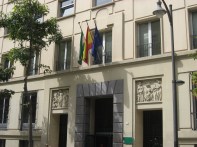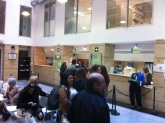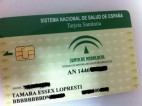140 - Back in the Arms of a State Health System
Wednesday, March 25, 2015
At the top of the stairs Marcelo took my arm solicitously. “Should you take the lift instead?” he asked. “We don’t want you to have an accident on the stairs, what with you having no health cover ….”. I shot a glance in his direction and he failed to hide his mischievous grin. But despite the joke, there was a worrying grain of truth in what he said.
 I thought I was planning ahead. I went online and booked an appointment at the INSS office in Málaga (the social security office), in mid-November 2014. My transitional health cover (paid for by the UK) was going to expire in January, and I wanted to ensure the Spanish health system had time to do the paperwork to sign me up without a gap in my health cover. That was the theory. I thought I was planning ahead. I went online and booked an appointment at the INSS office in Málaga (the social security office), in mid-November 2014. My transitional health cover (paid for by the UK) was going to expire in January, and I wanted to ensure the Spanish health system had time to do the paperwork to sign me up without a gap in my health cover. That was the theory.
There is a confusing range of different systems for immigrants who come to Spain. People receiving a UK pension are also get state health cover in Spain, paid for by the UK government. People under pension age, who are working here in Spain, pay into the social security system and are covered that way. For those of us falling between these two groups, we have the option of joining a private healthcare scheme, or going into the public system. In the UK I was a strong supporter of the state system, and my instinct here in Spain was to follow my heart and pay into the state system in Andalucía.
The right for immigrants to pay directly into the Spanish NHS is still quite new, and many offices don’t yet know that it exists! The INSS in Málaga denied all knowledge, until I finally got a manager to come out of a back office, and she eventually acknowledged the existence of the “Convenio Especial” but said I needed to go to the Junta de Andalucía offices in central Málaga. I’d done hours of internet research, and had read all the details of what documents I would need to take with me. Crucially, you need to have been an official resident for a full year, and bring the green residency card to prove it, along with a copy of the document showing that you have signed onto the Padrón at the local town hall. offices in central Málaga. I’d done hours of internet research, and had read all the details of what documents I would need to take with me. Crucially, you need to have been an official resident for a full year, and bring the green residency card to prove it, along with a copy of the document showing that you have signed onto the Padrón at the local town hall.
So armed with those (and copies, just in case!), I found my way to Marcelo’s office. Only then was the precious application form finally produced (it’s available online in other regions, but Andalucía seems to like to keep its existence rather more secret). He also produced a list of all the documents required – fortunately I had brought all of them. I told him that foreigners in Spain make jokes about “la ley de falta uno” (the law that there will always be one crucial document missing), but he assured me, hand on heart, that I had brought everything necessary. He stamped it all and ticked the items off on the list, then explained that we needed to go downstairs to have it all stamped by his colleague and sent off to the Junta at Sevilla. We by-passed the queue and went straight to his colleague. Once all papers were triple-stamped, Marcelo shook my hand and said that copies of the health contract should arrive within a couple of weeks, well before my UK-funded transitional care expired. sent off to the Junta at Sevilla. We by-passed the queue and went straight to his colleague. Once all papers were triple-stamped, Marcelo shook my hand and said that copies of the health contract should arrive within a couple of weeks, well before my UK-funded transitional care expired.
Then followed six weeks of checking the mailbox to no avail, as my “expiry date” of January 3rd crept closer. Christmas came and went, as did New Year. On January 7th an envelope with the prominent green lettering of the Junta de Andalucía appeared in my letterbox, but it felt worryingly thin, given that it was supposed to contain two copies of a thick contract. Just one thin sheet of paper came out of the envelope. “Your application is missing one document ….”. The law of “falta uno” had come into play again. Although I had already provided the S1 document which showed that my UK cover expired on January 3rd, they needed another letter from the Department of Work and Pensions Overseas Health Department to confirm it had expired, and that I had no further rights to cover from the UK. I phoned the DWP in Newcastle, and they couldn’t have been more helpful. The letter arrived within a few days, and clutching a few spare copies of it I went back to see Marcelo.
He stamped the document, and added the name of it to his list, to help future applicants. As we left his office to go downstairs for the second set of stamps he teased me about being between the two health systems, and advised me not to go skiing in the Sierra Nevada that weekend.
The rest of January passed, and I avoided skiing without much difficulty. February also came and went, and nothing arrived in my letter-box. I went back to see Marcelo again. When he saw me, his face fell. “Still nothing?” he asked, with genuine surprise. He phoned Sevilla and sounded rather firm. At one point I heard him emphasise that I had first applied back in November and that “we are leaving this woman without access to healthcare which is unacceptable!” he said. Putting down the phone, he promised the documents would arrive soon. And finally, they did. Two copies of a ten-page Convenio Especial (special agreement), a contract between the Junta de Andalucía and me. I signed both copies, and sent them back along with a bank receipt for the first month’s payment of 60€. And the nervous daily checking of the mailbox began all over again.

Mid-March, four months after my first visit to fill in the forms, and the mailbox clattered again. My Spanish health card arrived, and at last I am back in the safe arms of a state National Health System. And it feels very good.
© Tamara Essex 2015 http://www.twocampos.com
THIS WEEK’S LANGUAGE POINT:
The Real Academia Española is the great guiding light that guards the Spanish language, and tries to accept or reject changes and developments to it. Above all, it seeks to be the arbiter of truth and perfection in all things relating to the language. The trouble is, sometimes it makes very silly decisions.
In its list of revisions in 2013 it announced that the tilde was no longer required on the word“sólo” when it means “only”. The tilde had been used to differentiate the word from “solo”which means “alone”.
The article in El Mundo was immediately flooded with complaints. Some obvious objections were put forward demonstrating that the word NEEDS the tilde to clarify the meaning:-
“Trabajo solo este fin de semana. ¿Qué quiero decir? ¿Que no trabajo el resto de la semana o que trabajo en solitario este fin de semana?”
“Cuando estoy aquí solo pienso en eso / Cuando estoy aquí sólo pienso en eso. Las reglas deben estar, entre otras cosas, para esclarecer ambiguaciones.”
And then came the clincher ….. “Anoche hice amor solo tres veces.”
The Real Academia has now said that the tilde may be used. Sometimes, clarity is everything.
 0
Like
Published at 8:42 AM Comments (0)
0
Like
Published at 8:42 AM Comments (0)
139 - Time to Stand and Stare
Thursday, March 12, 2015
“I must to be informing you that due to unfavourable conditions we are to be cancelling your Northern Lights Tour this evening” said the Icelandic hotel receptionist. It was the best news we could have hoped for. The “activity forecast” was low for that Friday night, but if the tour went ahead and we saw little or nothing, that was that. But a cancellation! Great news! We were then automatically transferred at no additional cost, to the Saturday night – “activity forecast” 5 out of 8. Much more promising.
 These few days in Iceland had been spectacular. Coming from Europe’s southern coast up towards the Arctic was dramatic. Andalucía had been sprinkled with snow the week before, and it had settled in drifts in higher areas (giving rise to extensive mutterings, objecting to the UK government’s withdrawal of the pensioners’ Winter Fuel Allowance from those who had chosen to emigrate to countries with a higher average winter temperature). Flying over southern Iceland’s glaciers and landing in Reykjavik in February highlighted what living in snowy and icy conditions really means. These few days in Iceland had been spectacular. Coming from Europe’s southern coast up towards the Arctic was dramatic. Andalucía had been sprinkled with snow the week before, and it had settled in drifts in higher areas (giving rise to extensive mutterings, objecting to the UK government’s withdrawal of the pensioners’ Winter Fuel Allowance from those who had chosen to emigrate to countries with a higher average winter temperature). Flying over southern Iceland’s glaciers and landing in Reykjavik in February highlighted what living in snowy and icy conditions really means.
Both of us had been to Iceland more than once before. This mini-break was all about the Northern Lights – the last remaining item on my Bucket List. We’d both been slavishly tracking the Aurora Borealis Activity Forecast for weeks, and comparing it against the cloud cover. The ideal, of course, would be High Activity and minimum cloud. Friday night, the night of our booking, was not looking great. We agreed that if it wasn’t a great sighting, we’d pay to go again on the Saturday if there was room on any of the coaches. We crunched through the snow along the sea front into the centre of Reykjavik and asked at the Tourist Information Office whether they thought there’d be room on Saturday. With the promising Activity Forecast, Reykjavik Excursions were laying on every bus they could for Saturday, so there were still tickets available. “Shall we just buy them now?” we asked each other. The helpful Icelandic woman looked at our booking voucher. “No don’t book” she said. “You are with Reykjavik Excursions anyway, and tonight’s trip is likely to be cancelled so you will get a free trip tomorrow anyway.” We had assumed that the free “second chance” only kicked in if the weather was too bad to go out, whereas in fact the company does not go out if the chance of a good viewing is low – a great example of excellent customer service.
A thousand excited tourists in twenty coaches gathered at the bus station. Already there were some green lines appearing in the sky, visible even from the city centre. Each driver set off to a different isolated viewing location. Our bus parked beside an out-of-town roadside coffee-shop and we spilled off onto the icy road, optimistically clutching phone cameras and cheap happy-snappers, despite the guide explaining on the bus that we would mostly just get black pictures.
There are two problems. One is our eyes, and the other is a phone-camera. We’ve all seen photos and documentaries of the Northern Lights. So we have an image in our mind of bright waves and curtains of red and orange and blue and green. The Northern Lights are streams of particles, which together are bright and visible, but individually are very pale, and don’t trigger the “rods” in our eyes which read colours. We have “cones” which work in daylight and “rods” which work in the dark, and the rods especially need much brighter levels of light in order to open up and start seeing. So a film-maker can be shooting the lights, and only when viewing the shots later can they see the range of colours captured by the high-quality lens. “Live”, they may only have seen green and white.
So a very good camera with a really REALLY good lens will see much more than the human eye. And what about the iPhone? Significantly more useless than the human eye! I have 80 shots which just look black, despite the fact that I was seeing good strips of green and white light and even a tiny bit of blue! Putting a few shots through an enhancement programme afterwards brought out a bit of green, but nothing worth showing anyone!
But it wasn’t all about capturing it on one iconic photo to put on Facebook. Well ok, it was going to be about that, but hey, we have to roll with the punches! I stood next to a professional photographer and her photos showed the Northern Lights much more as we had seen them, plus a bit more.
But enough of the technical stuff (ie the excuses as to why my photos are rubbish!). The point was the experience. This was not a “Kodak” moment, it was a LIFE moment. “What is this life if, full of care, we have no time to stand and stare?” (William Henry Davies, “Leisure”, 1911).
Carol and I tumbled out of the coach, more excited than 8-year olds at DisneyLand. We were the first to scramble over the snow drifts and to head off into the darkness. For a few minutes it felt as though we were the only ones there on the crunchy snow in the dark Icelandic night. Above us, something began to happen which the scientists would describe as “particle streams” and we would describe as “magic”. A shimmering green arch of light made a perfect semicircle through the sky, dancing, thinning, thickening, becoming stronger, then weaker, waving slightly though maintaining more or less the same trajectory. Ahead, over a hill, another stronger line of green shot straight upwards like a laser. And to the left appeared four horizontal lines of green, wafting gently, occasionally merging then separating. few minutes it felt as though we were the only ones there on the crunchy snow in the dark Icelandic night. Above us, something began to happen which the scientists would describe as “particle streams” and we would describe as “magic”. A shimmering green arch of light made a perfect semicircle through the sky, dancing, thinning, thickening, becoming stronger, then weaker, waving slightly though maintaining more or less the same trajectory. Ahead, over a hill, another stronger line of green shot straight upwards like a laser. And to the left appeared four horizontal lines of green, wafting gently, occasionally merging then separating.
A blue mist hovered around one end of the arch, causing arguments between those who could make out the blue (people whose eye “rods” opened at a lower level of blue than others), and the exasperated others, swivelling and staring and dejectedly asking “Where? What blue, where?”. Pointlessly, we aimed our phones roughly towards the lights, and despite nothing appearing on the screens, pressed the shutters. Mostly though, phones and cameras remained in pockets. This was about standing, and staring, and marvelling at what Nature is and does.
 We 45 insignificant specks on the ice. All of us wrapped like Michelin men. Standing in silence. Staring. Wondering. Awestruck. Gaping. There were no words. It wasn’t the most spectacular display there had ever been (the activity level had dropped to 4), but the Northern Lights were up there, waving around in the sky, this technically explicable but fundamentally inexplicable wonder of the world, spreading across the sky above us. We 45 insignificant specks on the ice. All of us wrapped like Michelin men. Standing in silence. Staring. Wondering. Awestruck. Gaping. There were no words. It wasn’t the most spectacular display there had ever been (the activity level had dropped to 4), but the Northern Lights were up there, waving around in the sky, this technically explicable but fundamentally inexplicable wonder of the world, spreading across the sky above us.
We took time, we stood, we stared. Then back to the Reykjavik hotel, the next day to Gatwick, and the day after to Málaga. From south to north and back again.
© Tamara Essex 2015 http://www.twocampos.com
(Photos by Reykjavik Excursions, for reasons stated! But all taken on our evening trip)
THIS WEEK’S LANGUAGE POINT:
The subtle difference between something making me happy, and me making myself happy because of something! ¡Uy!
“Me alegro de verte” – literally, I make myself happy due to seeing you.
“Me alegra verte” – literally, Seeing you makes me happy. Same but different.
“Me alegra que vengas con nosotros” - literally, It makes me happy that you will come with us (the “que” triggering the subjunctive in this one).
“A nosotros nos alegramos mucho de ésta noticia” - We made ourselves happy due to this news.
“A nosotros nos alegró mucho la noticia” - This news made us very happy.
I’m going to stick to “Me alegra verte” and “me alegra tu noticia” etc. More straightforward. Also, that is the easy response when someone says something good (they arrived back safely, their friend had a baby, the dog got over its sickness) – “Aaaah! Me alegra.”
 1
Like
Published at 12:28 PM Comments (0)
1
Like
Published at 12:28 PM Comments (0)
138 - England, Oh England ...
Wednesday, March 4, 2015
Got into the wrong side of the car once last week. Too used to getting into the left seat now.
Said “hola” to a stranger I passed on Shaftesbury’s narrow pavements. Fortunately it was misheard, and fortunately too, greeting strangers is still socially acceptable in Dorset villages.
Panicked once at a tiny roundabout in Surrey, it was deserted, and neither going left nor right around it felt instinctively correct.
Threw my loo paper in a bucket in the corner, then remembered I was in the UK and had to fish it out and drop it in the toilet. Sorry, perhaps that is “too much information”!
Shared a cab with four Spanish youngsters from Bournemouth Airport to the town centre – it was confusing. We chatted away in Spanish and the Russian taxi-driver joined in too. The sun was shining, it was hard to fathom that I’d arrived back in the UK for a week-long visit. Getting out of the cab I grabbed a coffee and a bacon sandwich in Chikitita’s Spanish cafe in Bournemouth. A family at the next table, from northern Spain and living in Bournemouth, were planning their first ever holiday in Málaga and wondering if they’d like it. I assured them they would. it was hard to fathom that I’d arrived back in the UK for a week-long visit. Getting out of the cab I grabbed a coffee and a bacon sandwich in Chikitita’s Spanish cafe in Bournemouth. A family at the next table, from northern Spain and living in Bournemouth, were planning their first ever holiday in Málaga and wondering if they’d like it. I assured them they would.
Skyping a Spanish friend kept the language going but it feels as though now it is embedded deeply enough that in a week away I will not lose it all. Some messaging on the online group of classmates from the Escuela Oficial de Idiomas kept me up with their verb practice.
Outside in the streets it is clear that the General Election is getting closer and the UKIP threat is not diminishing. From where has this fear of difference come? A country that is admittedly short of space but so rich in food, wealth, and service industries, which once actively encouraged people in to do jobs the indigenous population didn’t care to do, has become a nation suspicious and aggressive to incomers, willing to believe regurgitated lies about “benefit-scroungers” and somehow able to ignore truths about the net tax contributions of workers originating from elsewhere. England, oh England …. it is true that England has changed, but it is not the variety of faces in the streets that has changed it for the worse, it is the hidden thoughts and open actions of a people who can convince themselves that their own problems are somehow caused by someone who escapes real risk, hardship and persecution to work in this country, to keep schools maintained and hospitals clean, to nurse our sick, repair our roads and roofs, build our extensions, or fix our plumbing. England, oh England …. when did you become so inward-looking and scared?
A weekend in Iceland lifts the sadness. A Peruvian woman, running the best crêperie in Reykjavik, says that incomers are about to overtake native Icelanders in the capital. Is that a problem? we ask. Goodness, no! she replies in Spanish. Iceland is an open country, Reykjavik is a modern, cosmopolitan city, which has welcomed incomers without fear or suspicion. But her viewpoint was not supported by a young Icelandic man we chatted to – he believed there were far fewer incomers. How much was true and how much was perception we didn’t know. He may have gone to school with many second-generation immigrants and seen them as Icelanders. She may see anyone who is not the classic blond Viking as being an incomer, or may spend the majority of her social life with other non-natives. There’s no way of knowing what influences people’s views of the population around them. Certainly what both of our non-scientific “interview sample” agreed was that neither the press nor the public think this is any sort of issue. that a problem? we ask. Goodness, no! she replies in Spanish. Iceland is an open country, Reykjavik is a modern, cosmopolitan city, which has welcomed incomers without fear or suspicion. But her viewpoint was not supported by a young Icelandic man we chatted to – he believed there were far fewer incomers. How much was true and how much was perception we didn’t know. He may have gone to school with many second-generation immigrants and seen them as Icelanders. She may see anyone who is not the classic blond Viking as being an incomer, or may spend the majority of her social life with other non-natives. There’s no way of knowing what influences people’s views of the population around them. Certainly what both of our non-scientific “interview sample” agreed was that neither the press nor the public think this is any sort of issue.
 Our first night in Reykjavik is minus 11° and the wind slices through us. Iceland is not part of the EU, so I assume British pensioners living there cannot receive the Winter Fuel Allowance. As I struggle to remain upright, wearing every item of clothing I own, the wind flaying the narrow strip of exposed skin, I think of the British living in Spain who complain that the average winter temperature there is about to mean the loss of their Winter Fuel Allowance. With or without the WFA, and despite the undoubted beauty of Iceland, I am glad I live in Spain. Our first night in Reykjavik is minus 11° and the wind slices through us. Iceland is not part of the EU, so I assume British pensioners living there cannot receive the Winter Fuel Allowance. As I struggle to remain upright, wearing every item of clothing I own, the wind flaying the narrow strip of exposed skin, I think of the British living in Spain who complain that the average winter temperature there is about to mean the loss of their Winter Fuel Allowance. With or without the WFA, and despite the undoubted beauty of Iceland, I am glad I live in Spain.
 In the Reykjavik hotel room, the BBC breakfast news shows the UKIP leader Nigel Farage. He is quietly confident about the forthcoming elections, and takes credit for changing the political face of Britain, or at least that of England (Scotland and Wales, to their credit, remaining largely free of anti-immigrant rhetoric and discrimination). The Icelandic sunshine and snow, in this welcoming, cultured and cultural city, brighten my spirit, as does the prospect of the Northern Lights tour that night. But inside I am chilled, not by the snow outside but by a sadness for my birth-country, happy to send its citizens to conquer, “develop”, and settle in all corners of the globe, but unwilling to offer others the same rights to settle or to share its wealth and resources. England. Oh dear, England. In the Reykjavik hotel room, the BBC breakfast news shows the UKIP leader Nigel Farage. He is quietly confident about the forthcoming elections, and takes credit for changing the political face of Britain, or at least that of England (Scotland and Wales, to their credit, remaining largely free of anti-immigrant rhetoric and discrimination). The Icelandic sunshine and snow, in this welcoming, cultured and cultural city, brighten my spirit, as does the prospect of the Northern Lights tour that night. But inside I am chilled, not by the snow outside but by a sadness for my birth-country, happy to send its citizens to conquer, “develop”, and settle in all corners of the globe, but unwilling to offer others the same rights to settle or to share its wealth and resources. England. Oh dear, England.
© Tamara Essex 2015 http://www.twocampos.com
THIS WEEK’S LANGUAGE POINT:
Ir – to go. Irse …. all sorts of meanings!
Me va bien – It’s going well – literally, it goes well to me. eg “¿El curso? Me va bien.”
Me fue mal – It went badly – literally, it went badly to me / for me. eg “¡Uy! El examen me fue fatal.”
Me ha ido bien – It’s gone well. eg “¿Como va tu vida?” – “Gracias a Dios, me ha ido bien.”
 2
Like
Published at 6:44 PM Comments (2)
2
Like
Published at 6:44 PM Comments (2)
Spam post or Abuse? Please let us know
|
|